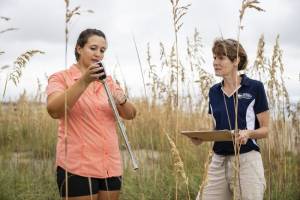Georgia Southern University graduate student, Shannon Matzke, is finding ways to help with destruction of sand dunes at Tybee Island, through restoration.
The sand dunes of Tybee Island have taken a beating in recent hurricane seasons. Georgia Southern University biology graduate student Shannon Matzke is researching ways to combat the destruction of the dunes for her restoration project by collecting data on the effects of various planting techniques to see which technique best increases the longevity of the dunes.
As a part of the project, Matzke collects monthly data on the growth and survival of plants, as well as on the sand accumulation associated with different planting densities and groups of species. She also spends time analyzing data, exploring new techniques and tools to use in the field, researching dunes and vegetation, and conducting outreach for the project.
“Working on the beach has been such a fun experience,” Matzke said. “It has also been rewarding to learn new techniques and how to use new equipment to answer more questions about the success of the restoration project. Perhaps my favorite part though has been the outreach associated with my project. The overall dune construction and beach nourishment is so important to island locals, and I’ve enjoyed being able to explain how my work fits in with the larger project.”

Matzke and Leege collect data for her sand dune restoration project. / Photo: GSU
Of the plants surveyed, 95% survived the first growing season. On average, plants doubled in height and canopy cover when compared to their size when initially planted. Matzke is also collecting data in areas of the constructed dune that were left bare to compare against the vegetated sites. Unlike the vegetated dunes, bare sites are experiencing erosion, which further relates the importance of adding native vegetation to any new dune construction.
Matzke said she was drawn to Georgia Southern and the biology department because of proximity to the coast. She also appreciated her advisor Lissa Leege’s, Ph.D., previous work with native and endangered plant species.
“I am so glad that I chose to earn my master’s at Georgia Southern because I have been able to make connections with researchers inside and outside of my department, as well as with industry and government professionals,” she said. “I have also enjoyed being able to work on Tybee and the convenience of having the Armstrong campus close to where I live in Savannah.”
Matze, who will graduate in fall 2021, hopes to continue her work with native plant ecology.
“After I graduate from Georgia Southern, I’d like to work for a state or local agency continuing in the natural resources management field,” Matzke said. “I am interested in continuing working on invasive species research, endangered plant conservation and habitat restoration using native species. My research at Georgia Southern is the perfect introductory experience to the type of work that I would like to continue doing.”
For more information on the department of biology, visit cosm.georgiasouthern.edu/biology/.
Source: GSU